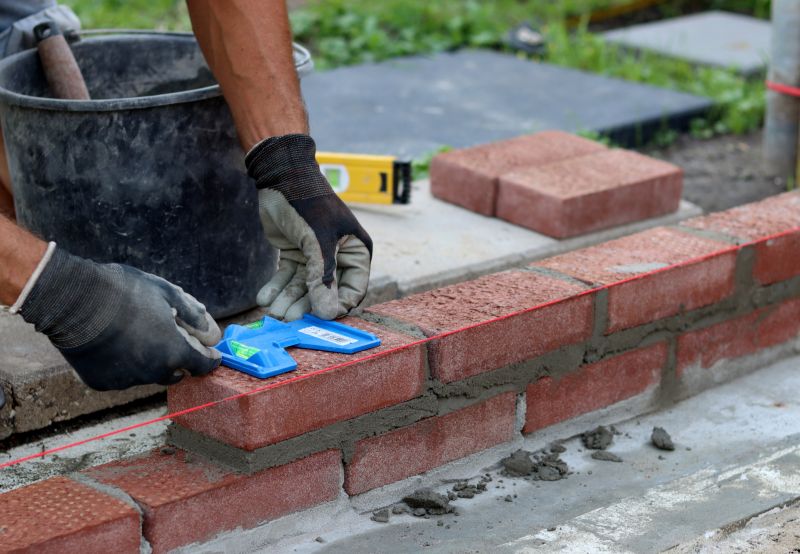Leading Products For Masonry Service Professionals
Discover essential tools and materials that enhance efficiency and quality in masonry projects for contractors and artisans.
 Masonry services require a diverse range of products to ensure quality, safety, and efficiency. From foundational tools to finishing materials, professionals and DIY enthusiasts alike need reliable equipment and supplies to achieve durable results. Proper selection of these products can facilitate tasks such as bricklaying, stone setting, concrete work, and restoration projects. Whether working on new constructions or repairing existing structures, having the right masonry tools and materials is essential for maintaining standards and ensuring safety.
Masonry services require a diverse range of products to ensure quality, safety, and efficiency. From foundational tools to finishing materials, professionals and DIY enthusiasts alike need reliable equipment and supplies to achieve durable results. Proper selection of these products can facilitate tasks such as bricklaying, stone setting, concrete work, and restoration projects. Whether working on new constructions or repairing existing structures, having the right masonry tools and materials is essential for maintaining standards and ensuring safety.
Top Overall Option
Masonry Tool Set
A comprehensive masonry tool set typically includes essential hand tools such as trowels, chisels, levels, and pointing tools, all designed to support various masonry tasks. These sets are often made with durable materials to withstand tough working conditions and provide consistent performance. Having a complete set can streamline workflow, reduce the need to search for individual tools, and ensure that workers have the right instrument for each step of the project.
Types of Products For Masonry Service
Brick Trowels
Used for spreading mortar and laying bricks with precision and control.
Pointing Tools
Designed for finishing and repairing mortar joints, ensuring a clean appearance.
Masonry Saws
Power tools used for cutting bricks, stones, and concrete blocks accurately.
Hammer and Chisels
Essential for shaping and splitting masonry materials during installation or repair.
Mixers
Portable or stationary devices for blending mortar, concrete, or grout efficiently.
Levels and Plumb Bobs
Tools to ensure vertical and horizontal accuracy in masonry structures.
Sealants and Water Repellents
Products used to protect masonry surfaces from moisture penetration.
Safety Gear
Includes gloves, eye protection, masks, and helmets to ensure worker safety.
Mortar and Grout
Materials for binding bricks and stones, available in various formulations.
Concrete Vibrators
Tools that help remove air bubbles and ensure proper compaction of concrete.
Brushes and Finishing Tools
Used for surface finishing, cleaning, and applying sealants.
Formwork and Supports
Frameworks used to shape and support concrete during curing.
Popular Choices
Portable drills suitable for drilling into tough masonry materials.
Hand tools ideal for finishing mortar joints with precision.
Versatile mixers that facilitate uniform blending of concrete and mortar.
Protective gloves designed for handling rough and abrasive materials.
Specialized hammers for splitting and shaping bricks and stones.
Products used to safeguard masonry surfaces from water damage.
Lightweight saws that enable quick and accurate cuts in masonry materials.
Efficient tools for preparing large quantities of mortar or concrete.
Protective masks to reduce inhalation of dust during cutting and sanding.
Tools for shaping, splitting, or removing masonry materials.
Assist in measuring and establishing level lines across large surfaces.
Tools for cleaning and finishing masonry surfaces.
Materials that accommodate movement and prevent cracking in masonry structures.
Containers designed for easy application of mortar in joints.
Head protection to prevent injuries during masonry work.
Tools that help eliminate air pockets and improve concrete density.
Tools for cutting bricks to specific sizes and shapes.
Tools for applying sealants evenly on masonry surfaces.
In masonry work, safety gear plays a crucial role in protecting workers from dust, debris, and physical hazards. Equipment such as gloves, eye protection, and dust masks are fundamental. Additionally, specialized tools like trowels, chisels, and levels help achieve precision and quality in each project. For larger tasks, power tools such as mixers, saws, and drills can significantly improve productivity. Selecting high-quality, durable products suited to specific types of masonry work can make a noticeable difference in the efficiency and outcome of a project.
Another important aspect is the selection of materials. Mortars, grouts, and sealants are vital for binding and finishing masonry structures. The right type of mortar depends on the project scope, environmental conditions, and material compatibility. For surface finishing, products like sealers and water repellents help protect masonry from moisture and wear. Proper storage and handling of these materials also contribute to their effectiveness and longevity. Overall, a comprehensive approach to choosing the appropriate products can support both the quality and longevity of masonry projects.
Key Buying Considerations
- Type of masonry work being performed (e.g., bricklaying, stone setting, concrete finishing).
- Material compatibility to ensure products work effectively together.
- Durability and quality of tools and materials to withstand tough working conditions.
- Ease of use and ergonomic design for comfort during extended use.
- Safety features such as non-slip grips, protective guards, and dust control.
- Power source options for power tools, including corded versus cordless models.
- Size and weight of tools for maneuverability and ease of handling.
- Availability of replacement parts and accessories for long-term maintenance.
- Environmental conditions, such as exposure to moisture or extreme temperatures.
- Project scale to determine whether to purchase professional-grade or DIY-oriented products.
- Cost and budget constraints without compromising essential quality and safety.
- Brand reputation and customer reviews for reliability and performance.
- Storage and transportation considerations for larger equipment.
- Compatibility with existing tools and equipment in your workspace.
- Availability of technical support and warranty services.
